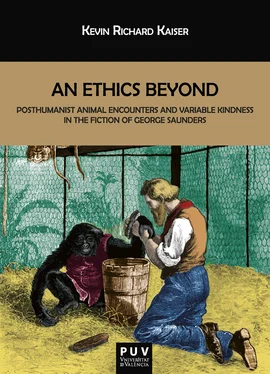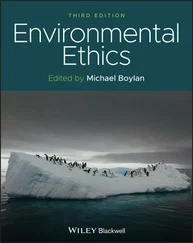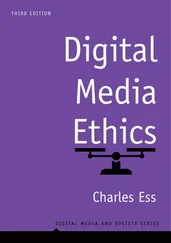AN ETHICS BEYOND
POSTHUMANIST ANIMAL ENCOUNTERS
AND VARIABLE KINDNESS IN THE FICTION
OF GEORGE SAUNDERS
BIBLIOTECA JAVIER COY D’ESTUDIS NORD-AMERICANS
http://puv.uv.es/biblioteca-javier-coy-destudis-nord-americans.html http://bibliotecajaviercoy.com
DIRECTORAS
Carme Manuel
(Universitat de València)
Elena Ortells
(Universitat Jaume I, Castelló)
AN ETHICS BEYOND
POSTHUMANIST ANIMAL ENCOUNTERS
AND VARIABLE KINDNESS IN THE FICTION
OF GEORGE SAUNDERS
Kevin Richard Kaiser
Biblioteca Javier Coy d’estudis nord-americans
Universitat de València
Kevin Richard Kaiser
An Ethics Beyond: Posthumanist Animal Encounters
and Variable Kindness in the Fiction of George Saunders
1ª edición de 2019
Reservados todos los derechos
Prohibida su reproducción total o parcial
ISBN: 978-84-9134-461-2
Ilustración de la cubierta: “Tending the invalid – A recent sketch at the Zoological Gardens”, The Graphic , London, 1874
Diseño de la cubierta: Celso Hernández de la Figuera
Publicacions de la Universitat de València
http://puv.uv.es
publicacions@uv.es
A tots els animals
En memòria de Spencer
Index
Preface Preface I approach the fiction of the award-winning American author George Saunders from the critical stance of posthumanism. This relatively recent theoretical development has taken many different paths, but the one that I am most interested in following is its deconstruction of anthropocentrism and repositioning of ethics to include “the Other.” Specifically, I am concerned how human and nonhuman animal others relate, especially in terms of ethics, and what this means to determinations of ethicality. The fiction of Saunders, which is often characterized as being both satirical and ethical, provides a place in which to explore notions of posthumanist ethics. His stories, novellas, and his novel all include nonhuman animals, either as characters or as details. Frequently, they are met with violence, abuse, and death. While Saunders does not write about nonhuman animals due to any particular agenda, their appearance in his fiction indicates how interactions with them may become ethical moments in quotidian American life. It is my belief that a study of posthumanist ethics through the acclaimed fiction of Saunders will allow for a greater awareness of just what posthumanist ethics is and what is at stake in conceiving new notions of ethics while also providing a critical examination of what is at play in his fiction and how he achieves what critics hail as his satirical yet ethical style.
List of Abbreviations
INTRODUCTION
CHAPTER 1 Empathy and Satire: The Fiction of George Saunders
CHAPTER 2 Beyond Humanism: Posthumanist Ethics
CHAPTER 3 The Ethics of Raccoons and Humans. “The 400-Pound CEO”
CHAPTER 4 Language, Meat, and Power: “Pastoralia”
CHAPTER 5 Determining Who Lives and Who Dies: The Very Persistent Gappers of Frip and The Brief and Frightening Reign of Phil
CHAPTER 6 Big Pharma and the Christ Monkey: “93990”
CHAPTER 7 The Animality of the Human “Puppy”
CHAPTER 8 Being Nonhuman: Fox 8
CHAPTER 9 Between the Dead and the Living: Lincoln in the Bardo
CONCLUSION
“Maybe We Don’t Know What Process Really Is”: An Interview with George Saunders
Bibliography
Preface
I approach the fiction of the award-winning American author George Saunders from the critical stance of posthumanism. This relatively recent theoretical development has taken many different paths, but the one that I am most interested in following is its deconstruction of anthropocentrism and repositioning of ethics to include “the Other.” Specifically, I am concerned how human and nonhuman animal others relate, especially in terms of ethics, and what this means to determinations of ethicality. The fiction of Saunders, which is often characterized as being both satirical and ethical, provides a place in which to explore notions of posthumanist ethics. His stories, novellas, and his novel all include nonhuman animals, either as characters or as details. Frequently, they are met with violence, abuse, and death. While Saunders does not write about nonhuman animals due to any particular agenda, their appearance in his fiction indicates how interactions with them may become ethical moments in quotidian American life. It is my belief that a study of posthumanist ethics through the acclaimed fiction of Saunders will allow for a greater awareness of just what posthumanist ethics is and what is at stake in conceiving new notions of ethics while also providing a critical examination of what is at play in his fiction and how he achieves what critics hail as his satirical yet ethical style.
List of Abbreviations
| Animal |
“The Animal That Therefore I Am (More to Follow)” |
| AR |
Animal Rites: American Culture, the Discourse of Species, and Posthumanist Theory |
| B&A |
The Beast & the Sovereign |
| CEO |
“The 400-Pound CEO” |
| CL |
“Consider the Lobster” |
| CSM |
The Companion Species Manifesto |
| EUP |
“E Unibus Pluram” |
| F8 |
Fox 8: A Story |
| HQ |
“Re: Humble Question Regarding ‘93990’” |
| LB |
Lincoln in the Bardo: A Novel |
| MVS |
“Mr. Vonnegut in Sumatra” |
| NS |
“Re: [no subject]” |
| Outtake #4 |
“Outtake #4: Having Eliminated Inner Horner, Phil Introduces the Loyalty Suspenders.” |
| Outtakes |
“Outtakes from Phil : Introduction.” |
| P |
“Pastoralia” |
| TBFRP |
The Brief and Frightening Reign of Phil |
| TBM |
“The Braindead Megaphone” |
| TNS |
“The New Sincerity” |
| TTA |
Thinking Through Animals: Identity, Difference, Indistinction |
| TPG |
“The Perfect Gerbil: Reading Barthelme’s ‘The School’” |
| TVPGF |
The Very Persisten Gappers of Frip |
| USH |
“United States of Huck: Introduction to Adventures ofHuckleberry Finn .” |
| Woof |
“Woof!: A Plea of Sorts” |
| WIWP |
“Why I Wrote Phil ” |
| WP |
What is Posthumanism? |
| WSM |
When Species Meet |
| WWRD |
“George Saunders: What writers really do when they write” |
| Zoontologies |
Zoontologies: The Question of the Animal |
Introduction
Unarguably, George Saunders stands in the vanguard of contemporary American fiction authors. His writing has appeared in magazines ranging from The New Yorker to GQ . He has received the National Magazine Award for fiction more than any writer except Alice Munro (both have been honored four years). Likewise, he has been the recipient of the PEN/Malamud Award and a MacArthur “genius grant.” In 2017, he won The Man Booker Prize for his first novel, Lincoln in the Bardo , and a year later was elected to the American Academy of Arts and Sciences. This is only a sampling of the accolades he has received. For his short yet impressive career, which spans about twenty-five years, Saunders, who currently teaches creative writing at Syracuse University, has been honored more than most authors can ever hope to be in a lifetime. Despite the plaudits, his aim is no different than that of any writer: to keep the reader interested. With four short fiction collections, a chapbook, a children’s book, a story-cycle, a separate novella, an e-book, a children’s book, an essay collection, a commencement speech, and now a novel—and a few stray or as yet uncollected writings—he has kept his readers wanting more, meanwhile establishing himself as one of the premier American fiction authors alive today.
Читать дальше












